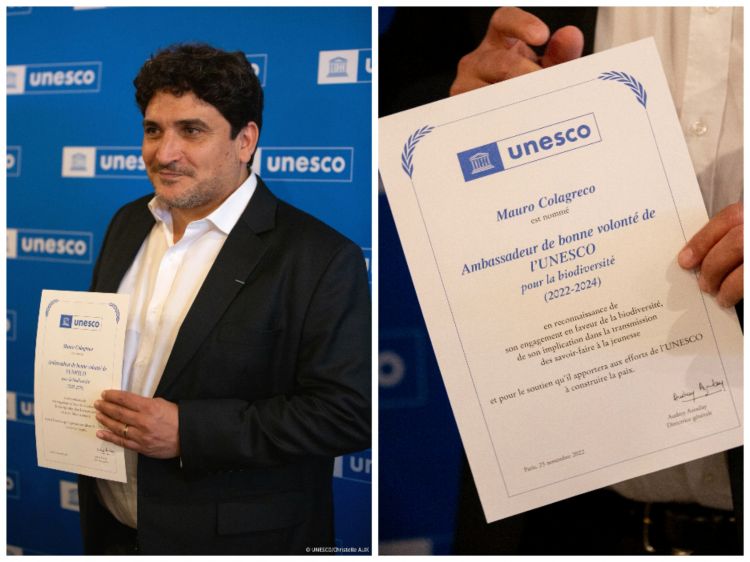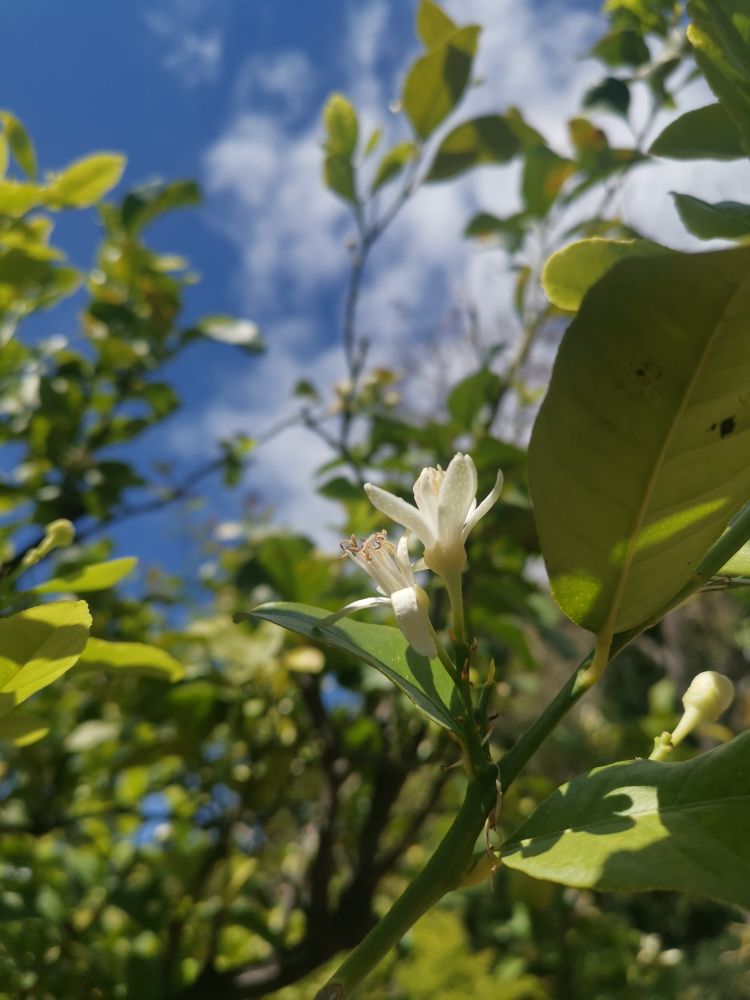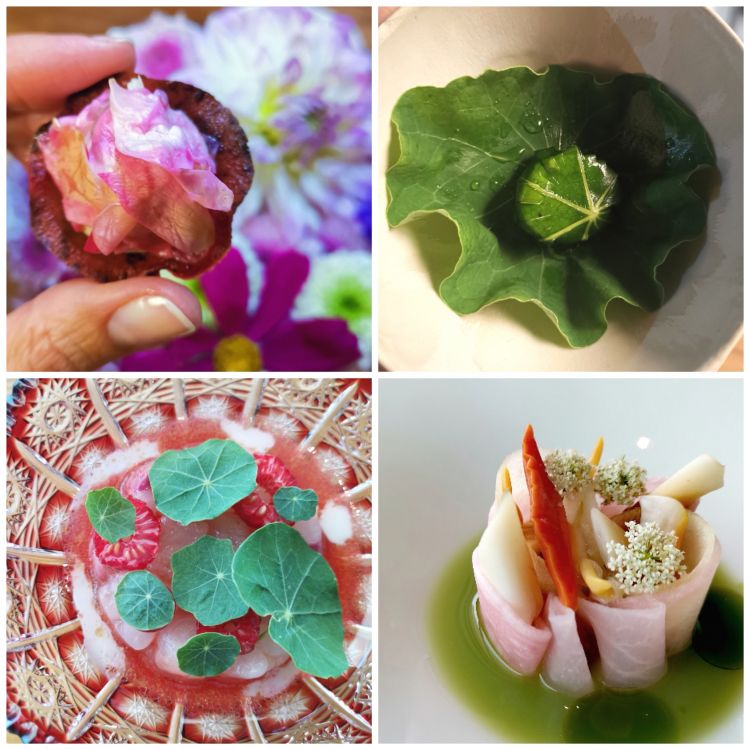On the 25th November, during a ceremony at the Université de la Terre in Paris, Mauro Colagreco was appointed 'Unesco Goodwill Ambassador for Biodiversity'. An exceptional fact - this is the first time a chef has received this appointment. Massimo Bottura is in turn 'Goodwill Ambassador of the United Nations Environment Programme', read here. - and at the same time very consistent with the path taken so far by the Italo-Argentine chef, originally from La Plata, who for years now has dedicated his work and efforts to promoting an awareness of the impact that food choices have on ecosystems. A mission that the patron of Mirazur - three Michelin stars and best restaurant in the world in 2019 according to The World's 50 Best Restaurants - shares with the United Nations Educational, Scientific and Cultural Organisation (Unesco for short) which, in establishing the Man and the Biosphere programme in 1971, set itself the goal of 'restoring the balance between human beings and their environment'.
Mauro, congratulations on this assignment, which is also a recognition of your work and commitment. It is the first time that a chef has received this recognition. Honour and honour, we say in Italy. How do you feel? And what does this assignment imply in concrete terms?
'I am happy, honoured and excited, and already at work shaping future actions which, of course, will go in the same direction as what we have done so far. Specifically, this recognition opens the door to a concrete and active collaboration with Unesco, which will entrust me with several projects for the promotion of biodiversity and environmental protection. There will also be a proactive part in which we will be the ones to present projects to Unesco in order to obtain its patronage and, above all, to help the United Nations to involve partners, i.e. companies interested in sponsoring various initiatives'.

‘There was no precise moment, it was rather a path, a gradual and increasingly strong awareness that gradually became intertwined with a dream. We could never have imagined that one day we would be able to have an influence on this level. Our efforts were aimed at having an impact around us, in our projects, at generating a change of attitude and an awareness among our co-workers, our guests. This shows that every action, no matter how small, can have a big impact and make a difference. There were certainly some moments that marked a jolt to my consciousness and knowledge: reading the book by
Masanobu Fukuoka [Japanese botanist and philosopher, exponent of natural agriculture and author of
The Straw Thread Revolution. His ideas influenced the development of the theoretical model of permaculture], the birth of my children, the encounter with the ideas and work of
Vadana Shiva [Indian physicist, philosopher and writer, activist and environmentalist committed to biodiversity and bioethics and the social, economic and geopolitical implications of the use of biotechnology and genetic engineering.
Colagreco met her in person in 2018 at a gastronomy congress in Munich which he curated and to which he had invited her as a speaker]. And then: the trip to Mexico in 2017, with my family, during which I was shaken and shocked by the sight of a beach completely invaded by plastic. This episode in particular generated in me a strong sense of indignation and then a sense of responsibility for the pollution of our seas – what was my contribution to that situation? - and prompted me to commit to eliminating plastic from my restaurant altogether [in 2020
Mirazur, along with the Michelin green star for its commitment to environmental issues, also obtained the
Plastic Free Certification that attests to the elimination of all single-use plastic from the restaurant], a goal also achieved at
Pecora Negra [
Colagreco's pizzeria in Mentone and Strasbourg] and on which we are also working at
Côte, Bangkok. There is still much work to be done'.

The ceremony that 'crowned' Mauro Colagreco on the 25th November
‘It is a continuous and daily challenge. It's a matter of educating people - the customers, but also the staff and the chefs who work with me - to succeed in changing their deep-rooted habits and changing their perception of what is considered luxury. What is true luxury? Being able to enjoy the flavour of a freshly harvested fruit or vegetable, from a living land, at its best: this is luxury, much more than foie gras or caviar. It’s a long path: first you have to win people's hearts, then you can try to educate them and make them change their perceptions and habits, to seek new solutions. Here everything, I mean everything, is wrapped in plastic. Being able to eliminate single-use plastic at
Côte is a challenge.
What is the most difficult part of this mandate?
‘We live in a society where contradictions abound. There are many issues for which we have not yet managed to find answers and solutions. Even in my own path there are contradictions. I am thinking for example of contracts signed in the past that I would not sign today because they do not match my commitment and my vision of the role of fine dining. In some contexts it is very difficult to have access to local products, but the important thing is to keep asking questions in order to find solutions. The goal is to change people's mindset on these issues, to draw attention to the interdependence between all living things and the impact that our food choices have on the environment in which we live. This new title of Unesco ambassador coincides with another post I have just been given: that of vice president of Relais & Châteaux [the association of luxury hotels and restaurants that currently has 580 members in 68 different countries and on five continents]. I hope that these two important positions will give me a great capacity for action, given the possibility of counting on a network and visibility that will allow me to involve other players. The main challenge is to redefine the concept of luxury. My predecessor, Olivier Rœllinger, presented a Relais & Châteaux manifesto before Unesco in 2014. My commitment is, ten years on, for 2024, to present one focused on the challenge of sustainability."

Mauro Colareco with his sons Luca and Valentìn
Biodiversity is a complex topic that can be approached from ethical, biological, nutritional, political, sociological, economic, moral and bioethical perspectives. What is your approach as a chef and why do you put it at the top of your priorities?
‘When you start to take an interest in a certain subject and go in depth, a world opens up in front of you: you learn new things, you expand your understanding of many things. When I arrived in Mentone, one of the first steps was to get to know and explore the local products and the context. My cooking adapted to what the place offered. When people saw that I was working with 30, 40, 50 different varieties of tomatoes, they asked me what was the reason for this obsession of mine, which was probably seen as an exaggeration, but which actually had very precise motivations. Taste first of all: it is very important for a cook to have different expressive nuances at his disposal, not all tomatoes taste the same, there are the sweeter ones, the more acidic ones, the juicier ones, the fleshier ones. Then there is the question of the season, of the harvest time: not all tomatoes are ready at the same time, some earlier than others: using different qualities of tomatoes guarantees a supply of different tomatoes for a longer period of time. Biodiversity in the garden also protects you from attacks by bacteria and diseases. One pest does not attack all varieties in the same way. If you only grow one type of tomato, for example, and it is attacked, you are left with nothing. If you have 6, 7, 8 types, it is easier for some of them to show resistance to the pest and save part of the crop. Study and experience have led me to understand many things. The importance of protecting biodiversity is one of them. Knowledge, study, are very important. Knowledge can save the world'.

‘When we heard that restaurants in France would be given permission to reopen, I had a moment of discouragement. It didn't make sense to reopen as before the pandemic. The team needed a new engine, a new motivation, and so did I: I asked myself what was the point of everything I was doing. During the lockdown I spent a lot of time working with my team in the gardens and vegetable gardens of Mirazur, when we reopened I wanted the restaurant to become part of the gardens: we decided to follow the lunar calendar in the kitchen and to start the experience with an immersion in our gardens. What do we want to tell with all this? There is an energy all around us that makes us feel small. Ancient cultures in South America knew this and still pay attention to it today in that part of the world. Ancient cultures were guided by the stars and the sky, today we have lost this attention and sensitivity. Our society has distanced itself enormously from Nature and our work aims to try to re-establish that connection.

Flower, Leaf, Fruit, Root: the menus at Mirazur
One of the tools
Mauro Colagreco uses to re-establish this connection is a sense of awe and a celebration of beauty, starting with that of Mentone and its surroundings. The lush gardens of the Côte d'Azur, its olive groves, its lemon trees, the woods and mountains that overlook it, the fishy sea that laps it, the centuries-old trees, the fruits of the earth and the coast: all this wonder has inspired and inspires
Colagreco. The chef uses talent, technique and creativity to translate it into his dishes - in a language that is both edible and aesthetic - interpreting it through four keys:
Root, Leaf, Fruit, Flower. What does
Mauro tell us about interpreting the wonder of creation through these four keys?
Recently visiting Mirazur, Carlo Passera used adjectives such as 'amazing' and 'extraordinary' (read more here) to describe his experience (documented among other things by Tanio Liotta's beautiful photos). Colagreco has not lost his grip, not at all, and in fact continually exceeds himself: sitting down at one of the tables in his restaurant is an awe-inspiring experience. Gustatory, sensory and aesthetic, and more.
For those fortunate enough to one day find themselves in that room and to get a deeper understanding of the work of the Italo-Argentine chef, we recommend watching the documentary Reinventing Mirazur and to keep in mind the words, written in the last century, of the American biologist and zoologist Rachel Carson, author, as it happens, of what is considered the founding book of the environmental movement, Silent Spring: "The more we can focus our attention on the wonders of the universe around us, the less we should find relish in destroying it."
Translated into English by Slawka G. Scarso